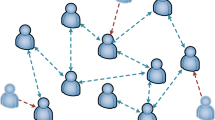Abstract
As an extension of wireless ad hoc and sensor networks, wireless mesh networks (WMNs) are employed as an emerging key solution for wireless broadband connectivity improvement. Due to the lack of physical security guarantees, WMNs are susceptible to various kinds of attack. In this paper, we focus on node social selfish attack, which decreases network performance significantly. Since this type of attack is not obvious to detect, we propose a security routing scheme based on social network and reputation evaluation to solve this attack issue. First, we present a dynamic reputation model to evaluate a node’s routing behavior, from which we can identify selfish attacks and selfish nodes. Furthermore, a social characteristic evaluation model is studied to evaluate the social relationship among nodes. Groups are built based on the similarity of node social status and we can get a secure routing based on these social groups of nodes. In addition, in our scheme, nodes are encouraged to enter into multiple groups and friend nodes are recommended to join into groups to reduce the possibility of isolated nodes. Simulation results demonstrate that our scheme is able to reflect node security status, and routings are chosen and adjusted according to security status timely and accurately so that the safety and reliability of routing are improved.
创新点
本文针对无线网状网中存在的节点社会自私攻击行为, 借鉴社会网络分析思想, 并结合节点的信誉评估建立安全的路由机制。该机制通过节点的行为信誉和社会相似性在网络中建立节点社团, 并在社团中寻找可靠的中继节点建立安全路由。同时, 鼓励节点加入多个社团并推荐好友节点加入社团, 以降低孤立节点出现的概率。该算法从主动和被动两方面激励节点间的合作行为, 最大限度地减少自私攻击对路由过程的破坏, 从而提高网络整体性能。
Similar content being viewed by others
References
Zhang Z S, Huangfu W, Long K P, et al. On the designing principles and optimization approaches of bio-inspired self-organized network: a survey. Sci China Inf Sci, 2013, 56: 071301
Huangfu W, Zhang Z S, Chai X M, et al. Survivability-oriented optimal node density for randomly deployed wireless sensor networks. Sci China Inf Sci, 2014, 57: 029301
Jo M, Han L, Kim D, et al. Selfish attacks and detection in cognitive radio ad-hoc networks. IEEE Netw, 2013, 27: 46–50
Beres E, Adve R. Selection coorperation in multi-source cooperative networks. IEEE Trans Mobile Comput, 2008, 7: 118–127
Zhang Z, Long K P, Wang J, et al. On swarm intelligence inspired self-organized networking: its bionic mechanisms, designing principles and optimization approaches. IEEE Commun Surv Tut, 2014, 16: 513–537
Zhang Z, Long K P, Wang J. Self-organization paradigms and optimization approaches for cognitive radio technologies: a survey. IEEE Wirel Commun, 2013, 20: 36–42
Mei A. Social-aware stateless forwarding in pocket switched networks. In: Proceedings of IEEE International Conference on Computer Communications (INFOCOM), Shanghai, 2011. 251–255
Szott S. Selfish insider attacks in IEEE 802.11s wireless mesh networks. IEEE Commun Mag, 2014, 52: 227–233
Zhu H, Du S, Gao Z, et al. A probabilistic misbehavior detection scheme toward efficient trust establishment in delay-tolerant networks. IEEE Trans Parall Distr, 2014, 25: 22–32
Chen I, Bao F, Chang M, et al. Dynamic trust management for delay tolerant networks and its application to secure routing. IEEE Trans Parall Distr, 2014, 25: 1200–1210
Paris S, Nita-Rotaru C, Martignon F, et al. Cross-layer metrics for reliable routing in wireless mesh networks. IEEE/ACM Trans Netw, 2013, 21: 1003–1016
Mahmoud M, Shen X. FESCIM: fair, efficient, and secure cooperation incentive mechanism for multihop cellular networks. IEEE Trans Mobile Comput, 2012, 11: 753–766
Guo J, Zhou X, Yuan J, et al. Secure access control guarding against Internal attacks in distributed networks. Wirel Pers Commun, 2013, 68: 1595–1609
Masdari M, Bazarchi S, Bidaki M. Analysis of secure LEACH-based clustering protocols in wireless sensor networks. J Netw Comput Appl, 2013, 36: 1243–1260
Qazi S, Raad R, Mu Y, et al. Securing DSR against wormhole attacks in multirate ad hoc networks. J Netw Comput Appl, 2013, 36: 582–592
Yu Y, Guo L, Wang X, et al. Routing security scheme based on reputation evaluation in hierarchical ad hoc networks. Comput Netw, 2010, 54: 1460–1469
Li Q, Zhu S, Cao G. Routing in socially selfish delay tolerant networks. In: Proceedings of IEEE International Conference on Computer Communications (INFOCOM), San Diego, 2010. 15–19
Yong L, Hui P, Jin D. Evaluating the impact of social selfishness on the epidemic routing in delay tolerant networks. IEEE Commun Lett, 2010, 14: 1026–1028
Ganeriwal S, Srivastava M. Reputation-based framework for high integrity sensor networks. In: Proceedings of ACM Workshop on Security of Ad Hoc and Sensor Networks (SASN), Hamburg, 2011. 66–77
Author information
Authors and Affiliations
Corresponding author
Rights and permissions
About this article
Cite this article
Yu, Y., Ning, Z. & Guo, L. A secure routing scheme based on social network analysis in wireless mesh networks. Sci. China Inf. Sci. 59, 122310 (2016). https://doi.org/10.1007/s11432-015-5467-7
Received:
Accepted:
Published:
DOI: https://doi.org/10.1007/s11432-015-5467-7





